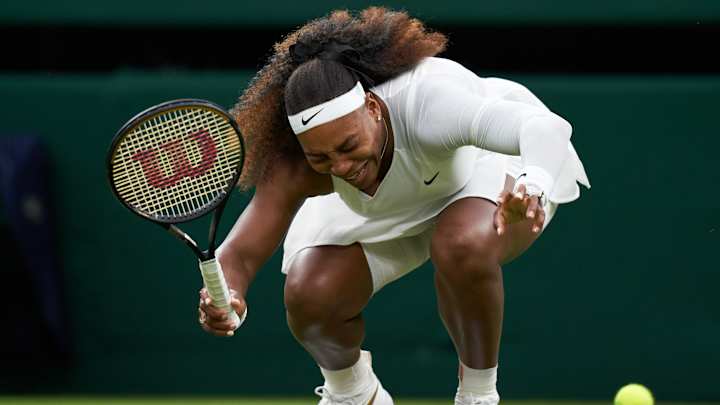Serena Williams's Wimbledon Withdrawal a Cruel Reminder of the Undefeated Record of Time

There is often something inspiring about watching athletes past the meridians of their primes, still trying to conjure magic. There can also be something excruciating.
We had a reinforcement of that Tuesday at Wimbledon. In one of the first matches of the day, Venus Williams, a five-time Wimbledon champ—but one who hasn’t won the title here in 13 (!) years—bushwhacked her way to a three-set win. At age 41, she is a shell of the fleet and graceful star who dominated these lawns for almost a decade. Who cares? Today, she celebrated this, her 90th match win here, as though she were a teenager.
A few hours later, Roger Federer sauntered onto Centre Court to kick off his campaign, a first-round assignation against France’s Adrian Mannarino. As athletes age, consistency, they say, is the first thing to go. For parts of the day, Federer looked like the 39-year-old man he is, sluggish and slow to reach shots that would have given no problem in his prime. For other parts of the match, he look like the eight-time Wimbledon champion that he is. After trailing 2–1 sets, Federer “got lucky” (his phrase) when Mannarino slipped awkwardly on the grass, wrenching his knee and was forced to retire. He survived and advanced as he pursues what would be a men's record 21st major singles title. And sadly that was a bit of foreshadowing.
The next Centre Court match featured Serena Williams, who, like Federer is 39, and like him, is in pursuit of the all-time majors singles record. Serena has 23, one off Margaret Court’s mark of 24. And if she is going to win, it was going to happen here on the most forgiving surface. That was the thinking anyway.
The same grass that was supposed to be so comforting betrayed her. Five games into her match against Aliaksandra Sasnovich of Belarus, Serena slipped on a slick spot of the turf, grimaced, and took an injury timeout. Like all elite athletes, Serena knows her body and its limits better than anyone. When she served through tears, unable to push off on her leg, it was more meaningful than any official diagnosis. At 3–3, she retired. Only from the match, one hopes.
One of the saddest sights you’ll see on the tennis court, Serena received a standing ovation from the Centre Court crowd as she walked to the net. It was an acknowledgment of past, present and future. It was the crowd’s way of paying homage to a queen—the queen— of tennis, the seven-time Wimbledon champion, and all she has achieved. It was acknowledgment in the present that Serena has been trying for more than four years now to tie the record, and has run into loads of misfortune. It was also an acknowledgment of the future: the reality that Serena Williams may never play Wimbledon again.
It is too early to know whether she will return for the U.S. Open as her next chance to win that elusive 24th major. Persistence has been one of her hallmarks. One of tennis’s immutable rules: discount Serena at your peril. But Tuesday we were reminded of another: the undefeated record of time.

Jon Wertheim is a senior writer for Sports Illustrated and has been part of the full-time SI writing staff since 1997, largely focusing on the tennis beat , sports business and social issues, and enterprise journalism. In addition to his work at SI, he is a correspondent for "60 Minutes" and a commentator for The Tennis Channel. He has authored 11 books and has been honored with two Emmys, numerous writing and investigative journalism awards, and the Eugene Scott Award from the International Tennis Hall of Fame. Wertheim is a longtime member of the New York Bar Association (retired), the International Tennis Writers Association and the Writers Guild of America. He has a bachelor's in history from Yale University and received a law degree from the University of Pennsylvania. He resides in New York City with his wife, who is a divorce mediator and adjunct law professor. They have two children.
Follow jon_wertheim